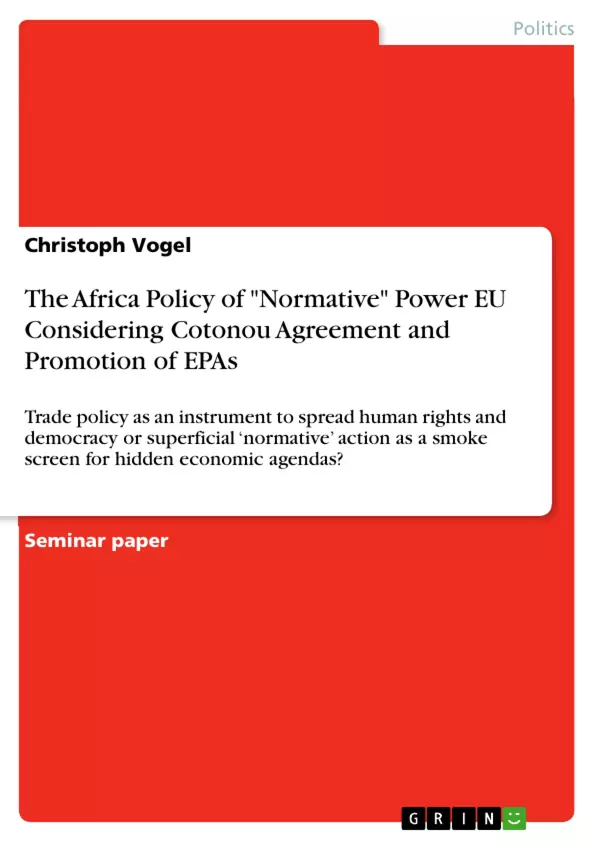Economic relations between the EU and ACP countries have a long tradition. After Yaoundé
conventions in the 1960s, 1975 the first Lomé Agreement was established between ACP
countries and EC member states. Between 1975 and 2000 EU and ACP countries ran four
subsequent Lomé conventions replaced by Cotonou agreement now. Lomé was concerned to
be an agreement providing ACP countries better access to European markets in order to push
economic development and build up domestic production. The emergence of WTO in 1995
changed the regulatory framework for regional trade agreements in such a way, that Lomé IV
could not pass into a fifth version. In order to be compliant with WTO measures, a new
agreement was worked out 2000 in Cotonou. It came into power in 2002.
The complete establishment of that treaty it is still far from becoming reality, as a
considerable number of ACP countries have still not negotiated EPAs. A crucial issue in these
negotiations is the division of ACP countries in six groups for regional EPAs. This division
does not merge with other regional trade and political networks in Sub-Saharan Africa and
does not include all ACP countries.
With ‘good governance’ having emerged as a ‘vital’ issue in international politics and
especially in EU’s agenda, a relevant number of non-economic issues found their way into
Cotonou agreement. By linking trade agreements and development aid with the spread of
European or Western democracy ‘standards’ those different fields were brought into contact.
The major question of the following research shall be, whether EU trade policy towards ACP
countries is supposed to be an instrument serving the diffusion of human rights and democracy
or rather a ‘smoke screen’ for a hidden economic agenda.
This research will work with different approaches rooted in political science following the
basic assumption EU-ACP cooperation has always been a political relationship. In the
following theoretical chapter (neo-)realist interpretation will be put in contrast to Ian Manners’
‘normative’ power approach using Lisbeth Aggestam’s framework of role model theory.
Further on, the research chapter will discuss characteristic matters of EU-ACP relations and
put into focus chances and perils of conditional economic cooperation and development aid.
Inhaltsverzeichnis (Table of Contents)
- 1. INTRODUCTION
- 2. THEORETICAL FRAMEWORK
- 2.1 ROLE MODEL THEORY
- 2.2 CONCURRENT THEORIES
- 2.2.1 EU AS A REALIST ACTOR
- 2.2.2 EU AS A NORMATIVE ACTOR
- 3. EMPIRICAL RESEARCH
- 3.1 THE NATURE OF EU-ACP RELATIONS
- 3.2 IMPLICATIONS FOR ACP COUNTRIES WITH FOCUS ON AFRICA
- 3.3 WTO COMPLIANCE AS A ‘REALIST' ELEMENT
- 3.4 POLITICAL CONDITIONALITY AS A ‘NORMATIVE' ELEMENT
- 4. CONCLUSION
Zielsetzung und Themenschwerpunkte (Objectives and Key Themes)
This research investigates the nature of the EU's trade policy towards ACP countries, specifically examining whether it serves as a tool for promoting human rights and democracy or masks underlying economic interests. It analyzes the EU-ACP relationship within the framework of role model theory, contrasting neo-realist and normative power perspectives. The study explores the implications of conditional economic cooperation and development aid for ACP countries, particularly in Africa.
- The EU's role in shaping the international system through its foreign policy.
- The interplay between economic and political objectives in EU-ACP relations.
- The effectiveness of using trade agreements to promote human rights and democracy.
- Analysis of the EU as both a realist and normative actor in international relations.
- Examination of the challenges and opportunities presented by conditional economic cooperation.
Zusammenfassung der Kapitel (Chapter Summaries)
Chapter 1: Introduction provides background on the historical economic relations between the EU and ACP countries, highlighting the evolution from Yaoundé conventions to the Cotonou Agreement. The chapter introduces the research question: Is EU trade policy an instrument for spreading human rights and democracy, or a cover for economic agendas?
Chapter 2: Theoretical Framework introduces Aggestam's role model theory and compares it to a neo-realist interpretation of the EU’s role in international relations, setting the theoretical basis for the empirical analysis. It uses the framework to analyze the EU as a ‘realist’ and a ‘normative’ power.
Chapter 3: Empirical Research delves into the characteristics of EU-ACP relations. It examines the implications of the Cotonou Agreement for ACP countries, focusing on Africa, and analyzes the roles of WTO compliance and political conditionality within this relationship.
Schlüsselwörter (Keywords)
EU trade policy, ACP countries, Cotonou Agreement, Economic Partnership Agreements (EPAs), human rights, democracy, neo-realism, normative power, role model theory, conditional cooperation, development aid, political conditionality, WTO compliance.
- Quote paper
- Christoph Vogel (Author), 2009, The Africa Policy of "Normative" Power EU Considering Cotonou Agreement and Promotion of EPAs, Munich, GRIN Verlag, https://www.grin.com/document/181556



